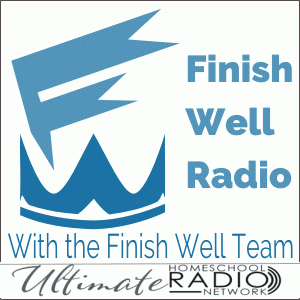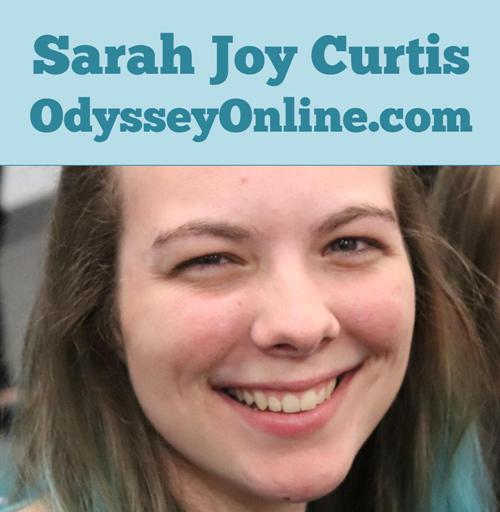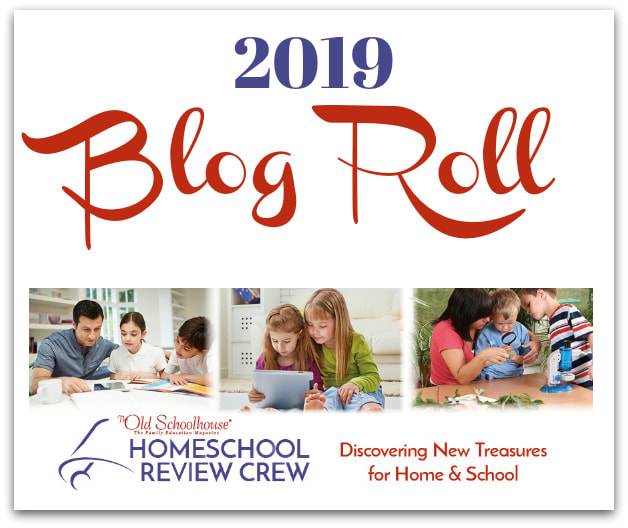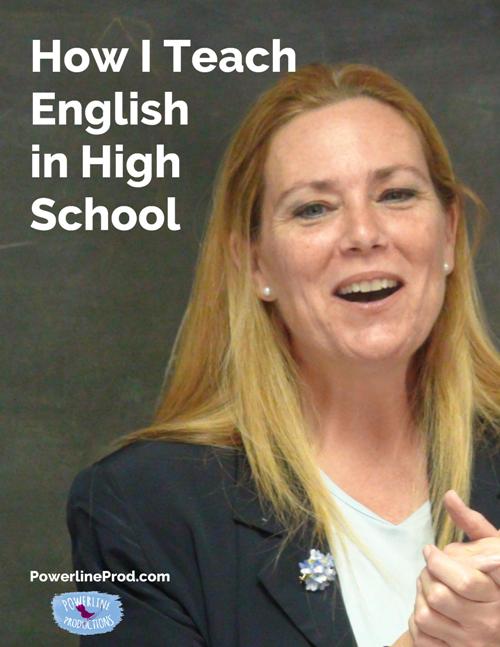 People often ask me how I teach English in high school. Maybe it's because three of my five children pursued writing careers after graduation and all five of my children love to read. First of all, I don't teach grammar or spelling in high school. Instead I use Daily Grams so my high school students won't forget what they already know. They just do one page a week or so throughout high school. It only takes us one copy of the workbook for all four years. Oh, speaking of four years, I teach five years of high school English, so one of the five courses is taught in eighth grade. I don't teach anything in any particular order in high school. Often I had a senior taking the same course as a sophomore or freshman. It's more fun to learn together. In each course, I teach specific skills. We also read classic literature, essays, and short stories. Each time I teach these courses, they are a little different because they target specific needs and interests of the one or two of my teens taking the course. Essays, Speeches, Thesis Statements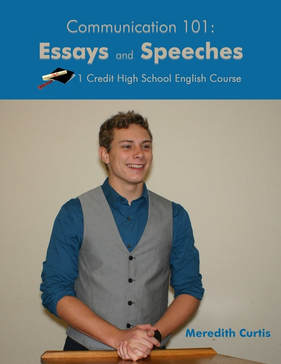 This course, Communication 101: Essays & Speeches, is where I teach, you guessed it, how to write an excellent essay and how to give a decent speech. Notice the difference. I focus more on excellence with the essay and more on becoming comfortable to speak in front of others in the speech part. Teenagers can be insecure about speaking in front of others, so unless there is a gifted speaker in our midst, my goal is to keep it lighthearted and fun. I found that all five of my children ended up speaking in front of groups of strangers at our Finish Well Conference by their senior year in high school and ENJOY it! Wow! I have never even graded speeches. I just praised them for whatever they did well. We do several kinds of speeches starting with reading a picture book aloud, an introduction speech, a demonstration speech, a persuasive speech and we dabble in debate at the end. We also do a commercial just for fun. The learning focus is essays. We work hard on crafting excellent and workable thesis statements that guide the essay. Every paragraph must support the thesis statement and we rewrite and craft each essay after reading it aloud to peers or family. We read a classic essay and then write our own essay in the same genre. Because we are reading classic essays and listening to speeches, we only read one book a month for this class. Of course, we read classic literature! Research, Working with Original Sources, Classic American Literature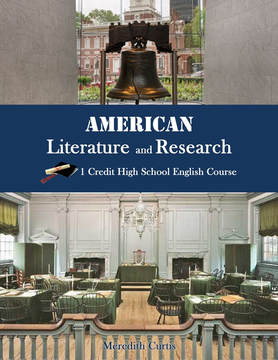 On the reading end, the focus is great American works from histories and poetry to adventures and humor in our American Literature and Research course. We read sermons and speeches aloud, as well as scenes from plays. On the writing end, our focus is research and presenting that research in a research paper. We start by learning to use original sources from the Age of Reason. We work with writings by famous Americans from Colonial Times like Cotton Mather and Benjamin Franklin. The kids summarize and paraphrase for two months. These skills are necessary for writing a research paper. Next, we work on thesis statements and how to prove them by starting with a research question. Now, they are set for actual research. We take a trip to the library to investigate their research question. The step-by-step research and writing a research paper begins with weekly meetings to read research and notes aloud and share ideas. Literary Analysis, Ancient Literature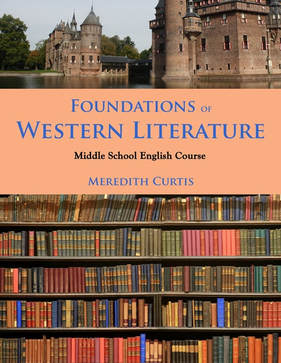 We love literature old and very old, even ancient works. In Foundations of Western Literature, we start at the very beginning with Genesis and work our way through ancient works by Aesop, Homer, Virgil, and Saint Augustine. While we move through history, we learn how to analysis literature starting with simple analysis and moving forward to a plot analysis later in the year. To end on a "let's get back to simple" note, we finish up with fairy tales from Grimm and Hans Christian Andersen. Of course, we have to write our own fairy tale, too. One thing we notice and discuss is how all the ancient plots are repeated over and over all the way up to today in plays, literature, movies, and TV shows. It's fun to see those ancient plots dressed up in modern clothes. Classic British Literature, Creative Writing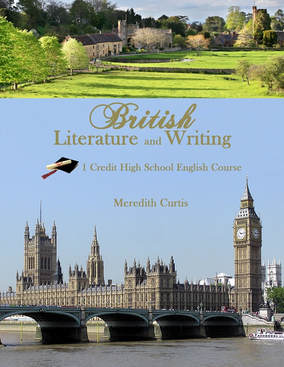 Great Britain is a treasure trove of amazing literature and we gobble it up in British Literature & Writing. As a history buff, I have to share a bit of British history as we go and move through the books chronologically. We love British literature! We use the literature as a springboard for writing assignments. When we read Canturbery Tales, we write "Tales to Israel." We write an allegory when we read Pilgrim's Progress and a sonnet when we read Shakespeare. We love to get into deep discussions about all the amazing stories we read during the British Literature course in a book club setting complete with coffee and hot chocolate. And, of course, homemade cookies. Golden Age Mysteries, Creative Writing, Writing a Novel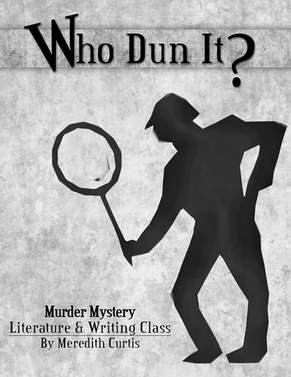 I always wanted to have my teens write a novel in high school. We have used some amazing curricula for this from Konos and One-Year Adventure Novel. When my third high school student came along, we tried something new. Since we both loved mysteries, we created our own "Write a Mystery Novel" course and we named it Who Dun It Murder Mystery Literature & Writing. We read "Golden-Age" mysteries by amazing authors like Agatha Christie, Sir Author Conan Doyle, Dorothy Sayer s, and G.K. Chesterton. We discussed the books and short stories we read throughout the year, noticing how the author built suspense, tricked us with red herrings, developed characters, and surprised us with the twist ending. We spent half of the year developing our characters, especially our detective and sidekick, as well as working on dialogue, clues, red herrings, and plots. We worked on our stories as if they were one scene followed by the next scene and the next scene, etc. Because of this, we watched classic TV mysteries, too, like Perry Mason and Monk. We wrote a short story before Christmas and spent the rest of the year working on our novel. Along the way, we read our stories aloud to each other and tweaked as needed. Grammar Review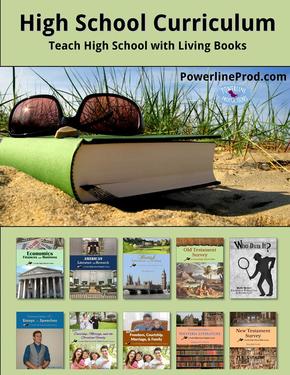 As I mentioned earlier, we don't study grammar or spelling in high school, we just review grammar once a week with Daily Grams. I do grammar and spelling each year from third to seventh grade. Then we stop. In high school, we focus on writing skills, as well as reading and discussing classic literature and works. If you would like to use my English courses in your own homeschool, they are all available for sale in print at Amazon and as E-books from PayHip and TeachersPayTeachers. You can learn more about all my high school courses here. You can learn about individual English courses from their sale pages below: Communication 101: Essays and Speeches Foundations of Western Literature American Literature & Research British Literature & Writing Who Dun It? Murder Mystery & Writing Whatever path you choose for English in your own high school home school, I hope it will include lots of classic literature and writing. I think back to the basics is best! Until next time, Happy Homeschooling! Warmly, Meredith Curtis
7 Comments
8/31/2018 09:40:05 am
I'll have to keep some of these great ideas in mind when we get to high school in a couple of years.
Reply
10/2/2018 07:23:39 pm
This is our last year of homeschooling. There is still so much I'd like to cover. Writing is so important and these are great resources. Communication 101 is on the list.
Reply
Meredith Curtis
10/3/2018 07:52:39 am
We loved Communication 101 because we ease into speeches and had a "no put downs of any kind rule" so everyone felt comfortable. We read our essays aloud to each other and learned to help each other. :) :)
Reply
Leave a Reply. |
AuthorsMeredith Curtis Archives
February 2020
Categories
All
|
Powerline Productions
- Home
-
Books
-
Curriculum
- HIS Story of the 20th Century >
-
High School Courses
>
- Economics, Finances, & Business >
- American Literature & Research
- British Literature
- Who-Dun-It Murder Mystery
- Foundations of Western Literature
- Communication 101: Essays & Speeches
- Old Testament Survey
- Worldview: Understand the Times Workbook
- Drama
- Career Choices & the College Decision
- Real Men 101
- Real Men 102
- Real Men 103: Leadership
- God's Girls 101
- God's Girls 103
- God's Girls 104: Motherhood
- God's Girls 105: Homemaking
- Travel God's World Geography >
- Government
- Unit Studies >
- Teach History the Fun Way >
- Families Learn Together American History >
- STEM Notebooking Pages
- Middle School Courses >
-
Bible
- Cozy Mysteries
- Blog
Photos from cloudzilla, Fil.Al, vaniljapulla, m01229, Ian D. Keating, (Imagine) 2.0, Theo Crazzolara, RomitaGirl67, RomitaGirl67, Gonmi, moonlightbulb, RomitaGirl67, Amydeanne, Salva Martinez, Graham Ó Síodhacháin, Ruth and Dave, infomatique, MsSaraKelly, moonrat42, {Guerrilla Futures | Jason Tester}, Monica's Dad, kennethkonica, o palsson, Tourismusregion Katschberg, wuestenigel, COD Newsroom, ANBerlin, Henri Photography, Tourismusregion Katschberg, Corey Ann, *_*, diannlroy.com, Theo Crazzolara, DaPuglet, terren in Virginia, George M. Groutas, Bunches and Bits {Karina}, Anders Ruff Custom Designs, ¥§•ªˆ¨ˇ© LOVE © ˇ¨ˆª•§¥, srqpix, inkknife_2000 (8 million views +), judy dean, ANBerlin, Phil Roeder, Base Camp Baker, Anders Ruff Custom Designs
 RSS Feed
RSS Feed

